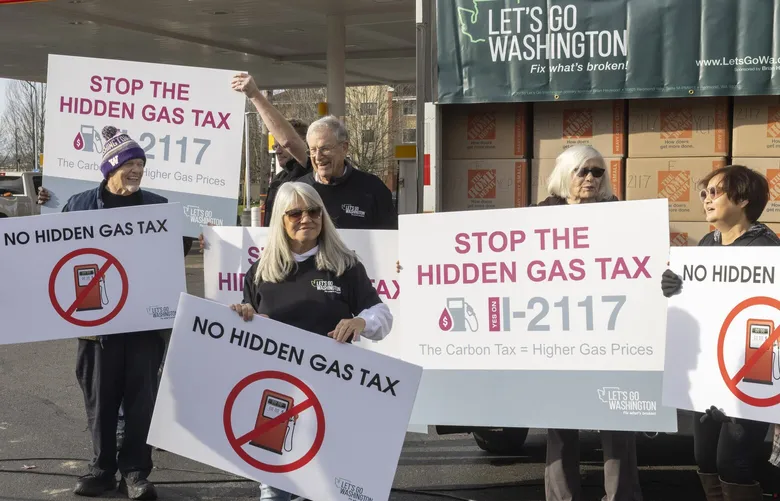I-2117 was supposed to be a way to prevent state agencies in WA from implementing any carbon tax trading systems aimed at reducing greenhouse gas emissions. It also would have repealed sections of the Climate Commitment Act, or CCA. (Washington) (Initiative)
(What is the Climate Commitment Act?)
The CCA is a Washington State law passed in 2021 aimed at reducing greenhouse gas emissions and combating climate change. It establishes a cap-and-invest system, where large carbon emitting companies must purchase carbon allowances, which are government issued permits that allows a company to emit a specific amount a CO2. A major part of the law is its focus on ensuring environmental safety, securing that vulnerable communities benefit from investments in clean energy and climate resilience. The Act collaborates with other states to expand the impact of climate efforts. The goal is to transition Washington to a sustainable, low-carbon economy while promoting equity and reducing climate-related inequalities. (Washington) (Initiative)
(Why was I-2117 rejected?)
Many critics argued that I-2117 would have significantly impacted businesses and cause financial difficulties, particularly in sectors reliant on fossil fuels. The initiative proposed stricter carbon reduction goals, and opponents feared it could lead to higher costs for businesses. This could potentially harm the state’s economy, especially in industries like transportation and energy. Along with this, there was a lack of clarity about how the proposed measures in I-2117 would be effectively implemented. Critics were concerned about the sensibleness of meeting the ambitious emissions reduction targets, as well as the absence of clear guidelines for achieving those targets, leading to doubts about the initiative’s practicality and long-term effectiveness. (Voters) (Initiative)
(Is Initiative 2117 being repealed a good thing?)
Some supporters of I-2117 believe repealing the initiative might delay progress toward achieving these critical environmental targets. Saying the initiative could’ve been a necessary step toward achieving sustainable energy practices and reducing Washington’s carbon footprint. While opponents argued that its provisions could place significant financial burdens on businesses, particularly those in industries like transportation, energy, and manufacturing. They believe repealing I-2117 could be seen as beneficial for maintaining economic stability. Also stating that by repealing the initiative, jobs and economic growth in these industries are protected. (Voters)
CIATATIONS:
Washington voters reject I-2117, uphold landmark Climate Commitment Act
Corlew, Taylor, and KOMO News Staff. “Washington voters reject I-2117, uphold
landmark Climate Commitment Act.” KOMO News, 5 Nov. 2024, komonews.com/news/
local/
initiative-2117-state-agencies-carbon-tax-credit-trading-renewable-energy-conserv
ation-emissions-reduction-2024-election-december-5-revenue-state-expenditures.
Accessed 27 Nov. 2024.
Washington state voters reject Initiative 2117 to repeal climate law
Cornfield, Jerry. “Voters strongly rejecting measure to repeal landmark
Washington climate law.” Kitsap Sun, 5 Nov. 2024, www.kitsapsun.com/story/
news/politics/elections/2024/11/05/
washington-state-voters-reject-initiative-2117-to-repeal-climate-law/
76086108007/. Accessed 27 Nov. 2024.
WA’s Climate Commitment Act: Voters reject bid to repeal it | FOX 13 Seattle
FOX 13 Seattle Digital Team. “Initiative 2117 fails, WA voters reject bid to
repeal Climate Commitment Act.” FOX 13 Seattle, 5 Nov. 2024,
www.fox13seattle.com/election/climate-commitment-act-voters-reject.
Accessed 27 Nov. 2024.



























